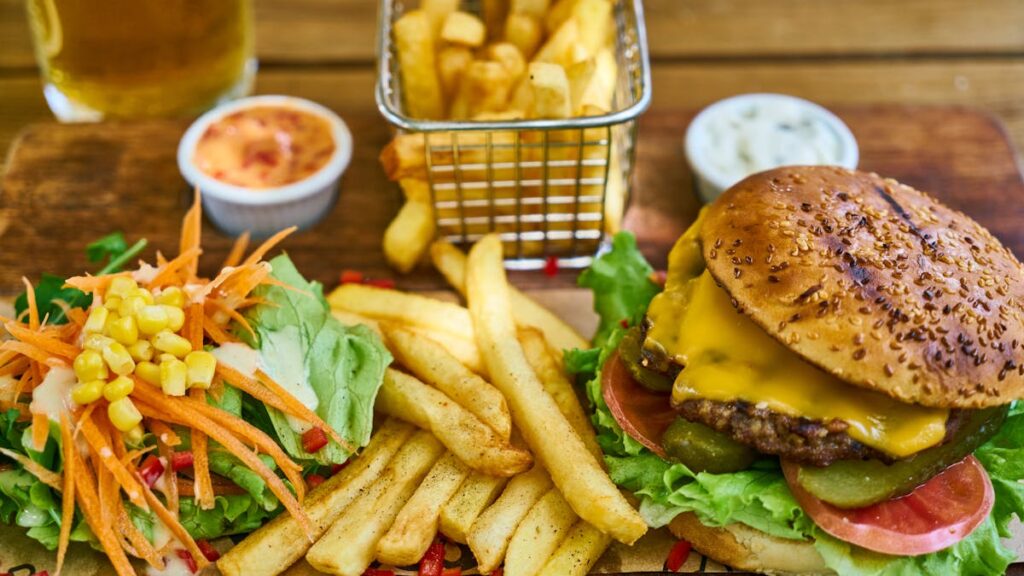Are you dreaming of serving up delicious, quick meals to hungry Kenyans?
You’re in the right place!
In this post, I’ll walk you through everything you need to know to start a small fast food business in Kenya.
From mouth-watering mandazi to sizzling nyama choma, the Kenyan fast food scene is ripe with opportunity.
Let’s dive in and cook up your path to entrepreneurial success!
What You’ll Need to Start a Small Fast Food Business in Kenya
Before we fire up the grill, let’s gather our ingredients.
Here’s what you’ll need to start a small fast food business in Kenya:
Legal Requirements:
- Business registration certificate
- Food handler’s license
- Health and safety permits
- Tax compliance certificate
Financial Resources:
- Startup capital (estimate: KES 500,000 – 2,000,000)
- Emergency fund
- Accounting software (e.g., QuickBooks, Wave)
Equipment and Supplies:
- Commercial kitchen equipment
- Food storage and refrigeration units
- Point of Sale (POS) system
- Initial inventory of ingredients
Location:
- High-traffic area
- Proper zoning for food businesses
- Adequate utilities (water, electricity, gas)
Menu Planning:
- Recipe development
- Pricing strategy
- Sourcing of ingredients
Remember, starting a small fast food business in Kenya is like preparing a complex dish.
You need all the right ingredients, in the right amounts, to create something truly delicious.
Step-by-Step Instructions to Start a Small Fast Food Business in Kenya
Now, let’s roll up our sleeves and get cooking!
Here’s your step-by-step recipe to start a small fast food business in Kenya:
1. Research and Planning
Before you even think about firing up the fryer, you need to do your homework.
- Conduct market research: Who are your potential customers? What do they crave?
- Analyze competition: What are other fast food joints serving? How can you stand out?
- Develop a business plan: This is your roadmap to success. Don’t skip this step!
2. Legal Setup
Time to make it official and start your small fast food business in Kenya the right way.
- Register your business with the Registrar of Companies
- Obtain necessary licenses and permits from your county government
- Register for taxes with the Kenya Revenue Authority
3. Find the Right Location
Location can make or break your fast food business.
Look for:
- High foot traffic areas
- Proximity to offices, schools, or residential areas
- Adequate parking and accessibility
4. Design Your Menu
This is where the magic happens!
- Create a diverse menu that caters to local tastes
- Include vegetarian and healthy options
- Price your items competitively
5. Source Equipment and Supplies
Equip your kitchen for success:
- Purchase commercial-grade kitchen equipment
- Set up reliable supply chains for ingredients
- Don’t forget about packaging and utensils!
6. Hire and Train Staff
Your team can make or break your business:
- Hire passionate individuals with food service experience
- Provide thorough training on food safety and customer service
- Create a positive work environment to reduce turnover
7. Marketing and Promotion
Get the word out about your tasty offerings:
- Leverage social media platforms popular in Kenya (e.g., Facebook, Instagram)
- Offer opening promotions and discounts
- Engage with the local community through events or sponsorships
Remember, starting a small fast food business in Kenya is a journey.
Each step builds on the last, creating a recipe for success that’s uniquely yours.
Tips for Success in the Kenyan Fast Food Industry
Want to rise to the top of the Kenyan fast food scene?
Here are some secret ingredients to help you start a small fast food business in Kenya that thrives:
Understand Local Tastes and Preferences
- Incorporate popular Kenyan flavors into your menu
- Offer a mix of traditional and international fast food options
- Stay attuned to changing food trends in Kenya
Master Your Pricing Strategy
- Find the sweet spot between affordability and profitability
- Consider value meals or combo options
- Use psychological pricing tactics (e.g., 99 KES instead of 100 KES)
Prioritize Quality Control
- Develop strict food safety protocols
- Regularly train staff on hygiene standards
- Conduct surprise quality checks
Excel at Customer Service
- Train staff to be friendly and efficient
- Implement a customer feedback system
- Address complaints promptly and professionally
Embrace Technology
- Use a reliable POS system for efficient order management
- Offer mobile payment options (e.g., M-Pesa)
- Consider partnering with food delivery apps
By focusing on these areas, you’ll be well on your way to creating a fast food business that Kenyans will love.
Remember, success in the fast food industry is all about consistency and adaptability.
Keep your quality high, your service fast, and your ears open to customer feedback.
Common Mistakes to Avoid When Starting a Fast Food Business in Kenya
Even the best chefs sometimes burn the ugali.
Here are some pitfalls to avoid as you start a small fast food business in Kenya:
Underestimating Startup Costs
Reality: Starting a fast food business can be more expensive than you think
Solution: Create a detailed budget and add a 20% buffer for unexpected expenses
Neglecting Food Safety Regulations
Reality: Cutting corners on food safety can lead to serious consequences
Solution: Stay up-to-date with Kenyan food safety laws and implement strict hygiene protocols
Ignoring Competition
Reality: Kenya’s fast food market is competitive
Solution: Regularly analyze your competitors and find ways to differentiate your offering
Poor Location Choice
Reality: A great menu won’t save a bad location
Solution: Invest time in finding the right spot, even if it means paying a bit more in rent
Inconsistent Quality
Reality: Customers expect the same great taste every time
Solution: Standardize your recipes and processes to ensure consistency
Avoiding these common mistakes will help you navigate the challenges of starting a small fast food business in Kenya.
Remember, it’s okay to make mistakes – that’s how we learn and grow.
But by being aware of these potential pitfalls, you can save yourself time, money, and a lot of headaches.
Troubleshooting Common Challenges in the Kenyan Fast Food Business
Even the most well-planned fast food businesses face hurdles.
Here’s how to tackle some common challenges you might face as you start a small fast food business in Kenya:
Dealing with Supply Chain Issues
Challenge: Inconsistent supply of fresh ingredients
Solution:
- Build relationships with multiple suppliers
- Consider vertical integration (e.g., growing your own vegetables)
- Develop a flexible menu that can adapt to seasonal availability
Managing Cash Flow
Challenge: Balancing daily expenses with irregular income
Solution:
- Implement a robust accounting system
- Negotiate favorable terms with suppliers
- Consider offering pre-paid meal plans to improve cash flow
Handling Customer Complaints
Challenge: Negative feedback affecting your reputation
Solution:
- Train staff in conflict resolution
- Implement a formal complaint handling process
- Use feedback as an opportunity to improve your service
Adapting to Changing Regulations
Challenge: Keeping up with evolving food safety and business regulations
Solution:
- Join a local restaurant association for updates
- Regularly consult with a legal advisor
- Build relationships with local health inspectors
Remember, troubleshooting is part of the journey when you start a small fast food business in Kenya.
Stay flexible, keep learning, and don’t be afraid to ask for help when you need it.
Alternatives in the Kenyan Fast Food Market
The fast food landscape in Kenya is as diverse as its culture.
As you start a small fast food business in Kenya, consider these alternative approaches:
Different Fast Food Concepts
Fusion Cuisine
- Blend Kenyan flavors with international fast food
- Example: Nyama choma tacos or masala fries
Health-Focused Fast Food
- Cater to the growing health-conscious market
- Offer salads, smoothies, and grilled options
Street Food Upgrade
- Elevate popular street foods with a gourmet twist
- Think: Artisanal samosas or gourmet mandazi
Franchise Opportunities
Consider partnering with established fast food brands
Pros: Proven business model, brand recognition
Cons: Less control, ongoing franchise fees
Mobile Food Trucks
Lower startup costs compared to a fixed location
Flexibility to move to different locations
Great for testing menu items and building a customer base
Ghost Kitchens and Delivery-Only Models
- Capitalize on the growing food delivery trend
- Lower overhead costs without a dining area
- Focus solely on food quality and efficient delivery
When and why to use these alternatives:
- Fusion Cuisine: When you want to stand out in a crowded market
- Health-Focused: If located near fitness centers or health-conscious neighborhoods
- Street Food Upgrade: To attract both locals and tourists looking for familiar yet elevated options
- Franchise: If you prefer a proven system and are willing to follow established rules
- Food Trucks: When testing the market or if you enjoy the flexibility of changing locations
- Ghost Kitchens: If delivery is popular in your area and you want to minimize startup costs
As you start a small fast food business in Kenya, consider which of these models aligns best with your vision, resources, and target market.
Remember, the key to success is finding your unique niche in the vibrant Kenyan fast food scene.
Your Journey to Fast Food Success in Kenya
We’ve covered a lot of ground in our quest to start a small fast food business in Kenya.
From gathering the essential ingredients to troubleshooting common challenges, you’re now equipped with the knowledge to turn your fast food dreams into reality.
Remember, starting a small fast food business in Kenya is more than just serving quick meals.
It’s about creating experiences, building community, and satisfying the diverse tastes of Kenya’s vibrant population.
As you embark on this exciting journey, keep these key points in mind:
- Do your homework: Research, plan, and prepare thoroughly
- Stay legal: Comply with all regulations and obtain necessary permits
- Location matters: Choose your spot wisely
- Quality is king: Consistently deliver delicious, safe food
- Adapt and innovate: Stay flexible and open to new ideas
The Kenyan fast food market is ripe with opportunity for passionate entrepreneurs like you.
Whether you’re serving up classic Kenyan street food or putting a local twist on international favorites, there’s room for your unique flavors in this growing industry.
So, are you ready to fire up the grill and start your small fast food business in Kenya?
The journey may be challenging, but with the right ingredients – passion, perseverance, and a dash of creativity – your fast food venture can become the next big thing in Kenya’s culinary scene.
Bon appétit and best of luck on your entrepreneurial adventure!
Read also:
- Latest Food and Hygiene License Cost in Kenya
- #8 Profitable Food Business Ideas in Kenya
- Food Handlers Certificate Online Application in Kenya
FAQs: Starting a Small Fast Food Business in Kenya
Q: How much capital do I need to start a small fast food business in Kenya?
A: The initial investment can range from KES 500,000 to 2,000,000, depending on factors like location, equipment, and menu complexity.
Q: What licenses do I need to operate a fast food business in Kenya?
A: Key licenses include a business registration certificate, food handler’s license, health and safety permits, and a tax compliance certificate.
Q: How can I compete with established fast food chains in Kenya?
A: Focus on offering unique, locally-inspired menu items, providing excellent customer service, and leveraging social media for marketing.
Q: Is it better to rent or buy a location for my fast food business?
A: For most new businesses, renting is a safer option as it requires less initial capital and offers more flexibility.
Q: How can I ensure food safety in my fast food business?
A: Implement strict hygiene protocols, regularly train staff on food safety, and stay compliant with local health regulations.
Q: What are some popular fast food items in Kenya?
A: Popular items include nyama choma, chips (fries), burgers, pizza, chicken, and local street foods like mandazi and samosas.
Q: How can I attract and retain good staff for my fast food business?
A: Offer competitive wages, provide thorough training, create a positive work environment, and offer opportunities for growth and development.
Q: What are some effective marketing strategies for a new fast food business in Kenya?
A: Utilize social media, offer opening promotions, engage with the local community, and consider collaborating with food bloggers or influencers.


